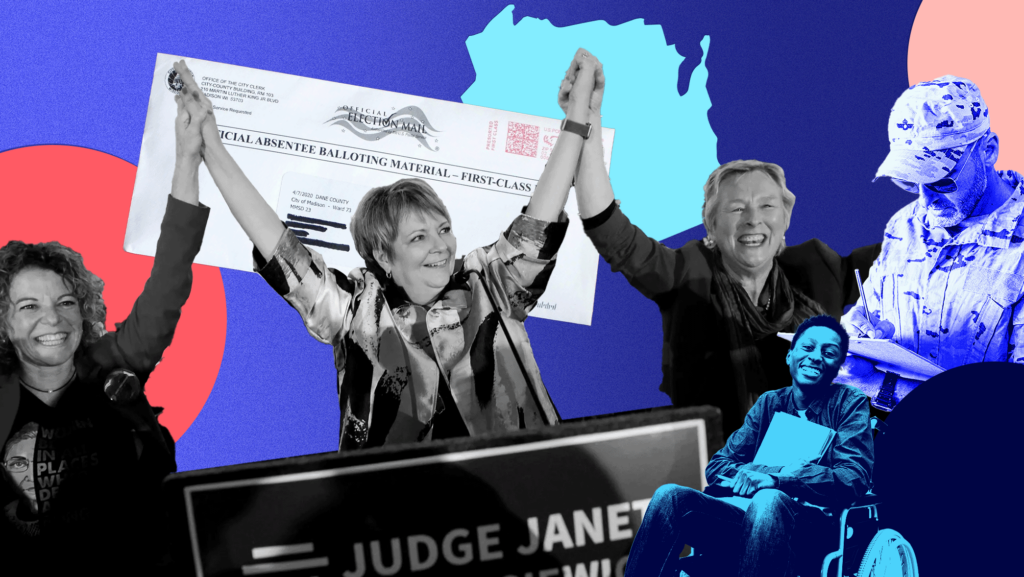Early Victories in the Fight for Democracy in Wisconsin

For many years Wisconsin had the distinction of having the most Republican gerrymandered state legislature and among the most conservative state Supreme Courts. It was the Wisconsin Supreme Court that came closest to giving former President Donald Trump a victory in challenging the results of the 2020 election. A toxic brew of antidemocratic laws and court rulings hung over an otherwise closely divided state.
Times have changed.
As a result of a critical judicial election, there is now a newly minted progressive majority on the state Supreme Court. Already the new Wisconsin Supreme Court has struck down the state’s heavily gerrymandered legislative maps. And recently, a motion to reopen a challenge to the state’s congressional maps was filed in the high court.
With the 2024 elections only months away, the focus has turned to the Badger State’s voting laws. Pro-voting groups have already notched some early victories. Voters with disabilities who are physically unable to return their absentee ballots won the right to have a person of their choice do it for them. A right-wing effort to prevent the counting of absentee ballots cast by members of the military failed. Most recently, a court affirmed the widespread availability of early, in-person absentee voting.
The most consequential cases, however, involve the state’s arcane absentee ballot witness requirement.
At the core of the fight is the fact that Wisconsin absentee voters must vote on absentee ballots and sign a certificate on the return envelope — in the presence of a witness. That witness, in turn, must then complete and sign their own certification.
It turns out that a surprisingly high number of people who witness absentee ballots make some type of error or omission in completing their own certification. The most common culprit was an incomplete witness’s address. A post-2020 election audit revealed that almost 7% of all absentee ballots suffered from some type of potential witness address certification defect and 5.4% were simply missing a zip code.
Is a zip code essential? If a witness fills in Milwaukee, but omits the state, is the address insufficient? What if the witness lives with the voter and simply writes “same”?
As a key battleground state, we should expect more litigation by both pro- and anti-voting forces in Wisconsin in the months to come.
Wisconsin law does not specify what is needed for an address and local election officials differ greatly on what information they require to consider the address requirement met and for the ballot to be considered properly cast.
Making matters worse, we know that rejected ballots are disproportionately cast by minority and young voters. With more than 1.3 million absentee ballots in the last presidential election year, the partisan impact on the election results is in the thousands of votes.
The good news is that the pro-voting forces have won the first major case involving witness addresses. A Wisconsin judge recently sided with the student group Rise, Inc. in holding that any witness address information on the certificate that can identify where a witness can be reached is sufficient. The court rejected the Republican Legislature’s argument that a witness must include a street number, street name, municipality and postal code for a ballot to be counted.
Meanwhile, two even bigger cases are pending in state and federal court. In state court, a pair of liberal organizations are suing to strike down the entire witness requirement as a violation of the Wisconsin Constitution. In federal court, a group of individuals are arguing that the witness requirement violates the Voting Rights Act’s prohibition on laws requiring a person to “prove his qualifications by the voucher of registered voters or members of any other class.”
A victory in either of these cases would transform absentee voting in Wisconsin. It would not only prevent ballots from being rejected for insufficient witness certifications, but it would increase confidence in communities that all too often are discouraged from voting because of the understandable fears of ballot rejection. It would also empower citizens who cannot reliably find a witness, but who also cannot vote in person, to participate in elections.
Standing on the other side of all these cases is the Republican Party and its anti-voting allies. Just as they demonized absentee voting in 2020, they are desperate to make absentee voting as difficult as possible in 2024.
Recall that it was in Wisconsin in 2019 when a Trump campaign advisor admitted that “traditionally it’s always been Republicans suppressing votes in places” as he assured the crowd that the GOP would “start playing offense a little bit.” After the 2022 election, a prominent Wisconsin election official boasted that because of the GOP’s plan, voter turnout in Milwaukee dropped by 37,000 votes “with the major reduction happening in the overwhelming Black and Hispanic areas.”
The absentee ballot cases are not the only voting cases pending in Wisconsin. Nor have we seen the last of new litigation that will inevitably be filed in the state before November. As a key battleground state, we should expect more litigation by both pro- and anti-voting forces in Wisconsin in the months to come.
So far, the pro-voting side has won the early battles, but the war to protect voting rights is not over.